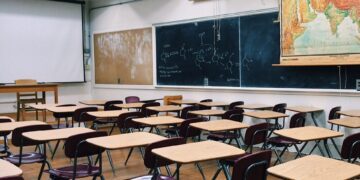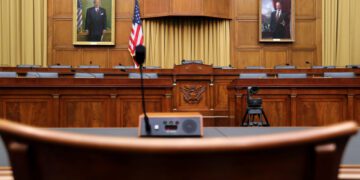By Hank Beckman -
Honorable people can disagree about the motivation for public K-12 school districts implementing remote learning during the COVID-19 pandemic.
Some, primarily on the left, maintain that the safety of students and teachers make virtual education necessary; conservatives will counter that the policy is nothing more than teachers' unions flexing their political muscle to get out of going to work every day like the rest of us.
Whatever the truth is, what can’t be gainsaid is that locking kids out of the classroom and expecting them to be educated by remote control is a practice that almost certainly has a disproportionately negative impact on students of color—and might actually be legally suspect.
Or, as the lawyers and civil rights activists might argue, remote learning, even if applied to all schools and communities in a given location, could still be prohibited because it has a “disparate impact” on non-white communities.
But first things first. No serious person denies that remote learning is anything like an ideal approach to educating schoolchildren.
“Nothing beats being in a classroom,” Jessica Dickler wrote in her March 2021 article on the CNBC website.
Dickler cites data from the Horace Mann Educators Corporation showing that 53 percent of students showed “significant” learning loss when educated virtually, with another 44 percent reporting some loss.
She also pointed to data from the Center For Disease Control reporting students suffered from physical and emotional drawbacks, increases in stress, anxiety, and consumption of drugs and alcohol.
The Urban Wire, blog of the Urban Institute, lists some of the reasons remote learning has a disproportionately negative effect on the education of black students. Among them are blacks being less likely to have a computer or Internet access in the home compared to white students (35-19 percent in favor of whites), less likely to have an adult with a high school education in the home (7 percent blacks, only 3 for whites), and more likely to live in poverty (35 percent blacks opposed to only 13 percent whites).
Research from the Brookings Institute points out that a whopping two-thirds of blacks live in remote-only districts, compared to white students, and that “Black, Asian, and Hispanic students, on average, were around 15 percentage points higher than white students to live in a ‘remote-only’ school district.” (Note the capitalization of non-white races; whites are apparently second-class citizens)
CNBC, Brookings, and the Urban Institute are hardly conservative organizations, and they are but a few resources to be found in a basic Internet search highlighting the negative effects of remote learning being magnified for minority students.
Of course, public school districts and their apologists will have an easy, ready answer to the charge of racial bias inherent in remote learning—it can’t be discrimination if the policy applies to all students, regardless of color or ethnicity. How can it be discrimination if there was no intent to single out one ethnic group, but that’s just the way the policy played out?
And that explanation will fly with the most partisan Democrats who will side with the party and its supporters in teachers unions no matter what, or haven’t really been paying serious attention to racial politics and related jurisprudence.
But those of us who are avid followers of politics and its ongoing battles will know that it’s not just media or activist groups complaining that remote learning is unfair to students of color. The U.S. Department of Education’s Office for Civil Rights minces no words about the matter.
The department’s web site addresses the issue and actually uses the term “disparate impact” in its title page.
Education in a Pandemic: The Disparate Impacts of COVID-19 on America’s Students.
The title doesn’t actually identify students of color as being victimized more than non-protected groups, but the first two pages of the document make it clear that minority students are the concern.
The relevant quote is that the Office of Civil Rights (OCR) “has the responsibility of enforcing laws enacted by Congress that guarantee all students have access to educational opportunities free from discrimination based on race, color, national origin, sex, disability or age.”
The report’s opening goes on to note the negative impact of COVID fell heavily on “historically marginalized and underserved groups,” and warned that “disparities can sometimes be evidence of legal injuries under federal civil rights law, even when policies and practices do not directly single out a group of people for harm.”
The use of the disparate impact theory as a means to attain a more fair society and redress past discrimination grew out of the Civil Rights movement and the legal battles that were fought against racial discrimination, particularly in employment, education, and housing.
The argument was that even if a practice or policy was applied equally, or “facially neutral,” in its application, it might still be prohibited if it had an adverse effect on a protected group.
For example, in the case of a discrimination suit brought against a company accused of using a test for hiring or promotions that has disparate negative impact on a protected group, the employer might have administered the policy in the same manner to every applicant or employee, but can still be found liable if members of a protected group winds up being hired or promoted less than members of other groups.
That was the finding in Griggs v. Duke Power, the 1971 Supreme Court ruling that established that facially neutral practices might be found legally injurious, even without the intent to harm a specific group.
The power company’s rule then was that to transfer out of low-paying labor departments employees needed a high school diploma and also pass two aptitude tests, one of them the Wonderlic IQ test. With blacks performing worse on these tests than whites, the plaintiffs argument was that the inferior education afforded blacks in North Carolina left blacks significantly less able to meet the requirements. In 1960, for example, census data revealed that 34 precent of whites held high school diplomas, as opposed to only 18 percent of blacks.
In his opinion, Chief Justice Warren Burger agreed.
He cited Title VII of the Civil Rights Act of 1964, which ruled that if tests disparately affected minority groups, a company must prove that the tests were “reasonably related” to the job for which the test is required.
“The touchstone is business necessity,” wrote Justice Burger. “If an employment practice which operates to exclude Negroes cannot be shown to relate to job performance, the practice is prohibited.”
But disparate impact theory doesn’t mean that group performance differences—on test results, for example—are rock-sold proof of discrimination, only that they might be; therefore claims of disparate impact deserve a serious investigation to establish that a practice or policy is reasonable.
A lawsuit in Illinois has been filed against school districts related to COVID issues, mainly over mask mandates; in Wisconsin, parents are suing districts over not requiring masks.
Less well-noted in media are the disparate impact suits filed against school districts in New York and Hawaii. In New York, the basic argument is that the digital divide has a disparate impact on students of color; on Hawaii, the affected group re special education students.
With the growing public skepticism over the health benefits over masks and remote learning, we may see many more of these lawsuits in the near future.







